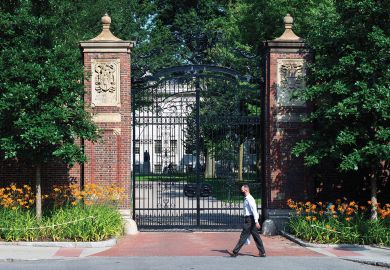The common problem of oversubscribed courses at US universities has met a possible match in a couple of University of Chicago students who are trying to arrange sales of slots to willing bidders.
The students, both seniors in economics at Chicago, describe already arranging sales between pairs of students at the neighbouring University of Illinois at Chicago, and at Cornell University, while hoping to expand it further.
The system, called Pollinate, involves a computer program that constantly checks each targeted university’s database for class openings, as a response to a chronic demand that too many institutions have not sufficiently addressed, said one of the student creators, Jonathan Merril.
“If we can somehow figure out how to solve it for one or two at first, and we can provide a great level of service,” Mr Merril said, “then we can somehow see ourselves doing it for a lot more universities.”
Some administrators and students at the initially affected institutions – which include the University of Chicago itself – acknowledged the underlying concern but predicted that the discovery and sale of course slots through Pollinate would ultimately prove technically and legally unworkable.
Yet US universities in many cases are not coming up with better solutions. One of the most chronically overcrowded is the University of California system, where reported individual sales of course slots in recent years have been run as high as $300 (£260).
The attempt by Mr Merril and his partner, Jack Ogle, to formalise the process seems to “start out with good intentions”, said Robert Dixon, registrar at the University of Illinois at Chicago.
“But this is not feasible,” Mr Dixon said, “because they would be having to operate with live data off of our student information system, and we don’t have public-facing real-time data on how many seats are available.”
That’s due in large part to the fact that UIC already has had its own experience with students with computer skills trying such things to help themselves or a few friends, Mr Dixon said. The constant automated queries harmed other students by slowing down the university’s computer services, so UIC hid its data on course availability.
Both Mr Dixon at UIC and a spokesman at the University of Chicago said that their institutions also have student code of conduct rules that would hinder such practices, including a ban on registering for courses that a student does not plan to attend.
And at Cornell several students have begun protesting against Pollinate through social media channels, calling it another tool for disadvantaging low-income students who are already struggling.
Mr Merril conceded that type of possible harm. But he said limited course availability already hurts those with the least flexibility in their lives. He said students trading course slots on Pollinate have paid an average of only $30, and he cited the case of one student hoping to save money by commuting with his sister who would gladly pay that amount so they could align their schedules.
UIC shares such concerns, Mr Dixon said. It realises, he said, that many students and lecturers prefer classes in the middle of the day and in the middle of weeks. But it insists on a broader spread throughout each day and week to help more students create their schedules, and it carefully monitors enrolment choices during the spring and summer months to optimise class availability for the autumn, he said.
Still many US universities, including UIC, consistently have cases where students must anxiously wait until their junior or senior years – when they finally get top selection preferences – to enter courses that are integral to their majors.
Mr Merril said he was agnostic about whether Pollinate would eventually gravitate toward a system where students pay to get into a needed class, or if the exchanges work some other way. “That’s okay,” he said, “it doesn’t need to be attached to money. But there’s no solution right now to a student who really wants to get into a class – they’re not able to choose to spend a little bit of money, or try to get into it in any way, other than pleading and begging the administration.”
Exceptions to general waiting lists for courses at UIC are very few, Mr Dixon said, generally involving athletes because of their frequent travel; those with a certified disability; and, by state law, military veterans. Students behind in payments can also be excluded, he said.
“We try to limit that to the barest minimum possible,” he said of course enrolment preferences, “because that creates divisions within a campus community.”
POSTSCRIPT:
Print headline: Course spaces go on sale in US
Register to continue
Why register?
- Registration is free and only takes a moment
- Once registered, you can read 3 articles a month
- Sign up for our newsletter
Subscribe
Or subscribe for unlimited access to:
- Unlimited access to news, views, insights & reviews
- Digital editions
- Digital access to THE’s university and college rankings analysis
Already registered or a current subscriber? Login








